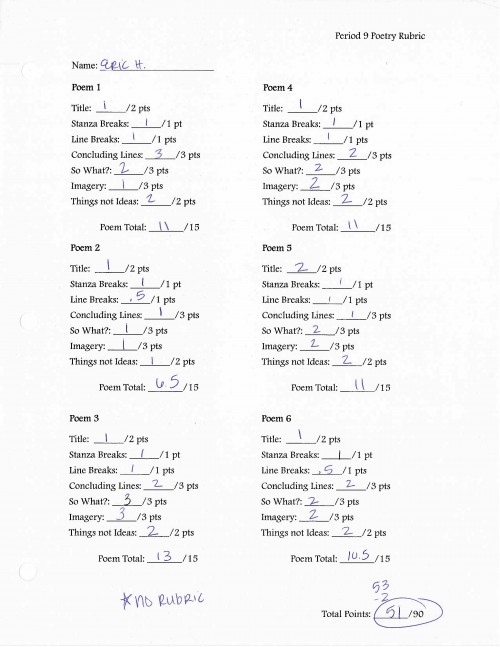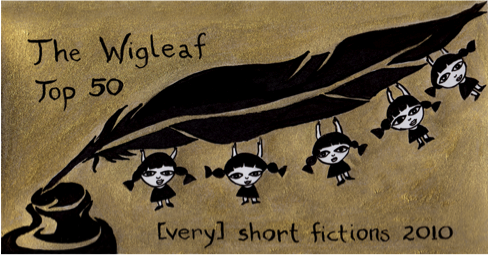How to Ruin a Child on the Possibilities of Literature Forever Without Really Trying
Meet Eric H. He’s 12 years old, and he just failed his poetry assignment. Why? Let’s consult THE POETRY RUBRIC.
Please consider helping the Center for the Art of Translation raise $15,000 this summer to bring Poetry Inside out to 250 new students this fall. Donate here.
“…so thieves, sirs, you are imbeciles, now return them.”

This, from the AP, via NPR:
A lone thief stole five paintings possibly worth more than half a billion dollars, including major works by Picasso and Matisse, in a brazen overnight heist at a Paris modern art museum, police and prosecutors said Thursday.
[…]
The director of the neighboring modern art museum Palais de Tokyo, Pierre Cornette de Saint-Cyr, called the thief or thieves “fools.”
“You cannot do anything with these paintings. All countries in the world are aware, and no collector is stupid enough to buy a painting that, one, he can’t show to other collectors, and two, risks sending him to prison,” he said on LCI television.
“In general, you find these paintings,” he said. “These five paintings are unsellable, so thieves, sirs, you are imbeciles, now return them.”
The assumption here, of course, is that the thieves would want to sell the work. Maybe they just wanted the paintings for their living room? Maybe they just wanted to steal them, to see if they could? Such an act of daring, commodified. Shame.
What’s your fantasy heist?
The Wigleaf Top 50 [Very] Short Fictions 2010
are live and listed now, with this year’s final judge Brian Evenson.
I subscribe to the New Yorker, but I rarely read the poems in it very closely. And I have no intention of submitting my poems to them. But I don’t want them to stop publishing poetry. Why? This article in the NY Review of Magazines talks about that, and more. Who knew the NYer put out 29,000,000 pages of poetry every year?
Identity Loss

(This is another short reaction to the films in this list. I have now had a chance to see 13 of the 50. When Blake first posted to the list, I had seen four. The first two on the list are on my nightstand. A few others I have found at Seattle’s Scarecrow Video. Some are proving very difficult. Any help procuring the Dore O movie Alaska would be appreciated.)
Another recurring theme from the films on the list is that of identity loss. A film from the last post (Cure) and a film I watched a few days ago (The Night of the Hunted) both had contrasting kinds of identity loss.
Here’s John Clute’s The Darkening Garden: A Short Lexicon of Horror on the subject:
In horror…[Identity Loss] works as a confirmation of the self’s purchase on the present tense of the daylit daily world; it is a marker of Belatedness made visible or to come; it is a signal that the abandoned past (over the last two centuries, most of our pasts have been abandoned) is catching up with us.
Cure’s antagonist has rejected his own identity. When questioned (by those who attempt to help him when they find him wandering aimlessly, by the police who suspect him of murder), he claims no memory of anything. He claims to make few new memories, asking his inquisitors their identities even after they have introduced themselves and never being sure just where it is he is. He claims that all the things that were once within him are now on the outside; that he is a shell.
READ MORE >
Are we really all reviewers?
Here’s a cool new thing if you’ve got the cash to spare: The Rumpus has started up a book club in which you’ll be sent an advance copy of some anticipated novel each month in exchange for twenty-five dollars. At the end of that month you’ll be invited to “a moderated online discussion” with the author.
“It used to be that only people in the media got advance copies of books but that wall has come down quite a bit. Now everybody’s a reviewer.”
Really? Are we all reviewers now?



 Wonderfully lucid and idea-rich post by AD Jameson at Big Other:
Wonderfully lucid and idea-rich post by AD Jameson at Big Other: 